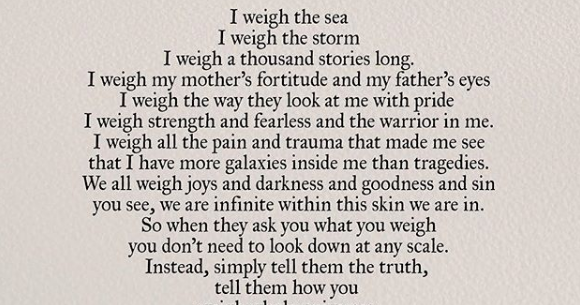“I weigh: Lovely relationship. Great friends. I laugh every day. I love my job. I make an honest living. I’m financially independent. I speak out for women’s rights. I like my bingo wings. I like myself in spite of EVERYTHING I’ve been taught by the media to hate myself about.”
Included with this post was a call to action inviting others to send her their “weight,” tabulated by interests and roles and life experiences, hashtag f*cking kg (kilograms). Jamil suffered from an eating disorder as a teenager and knows how negative some of the media messages we receive about our bodies can be. Instead, she invited people to rewrite these messages, claiming identities beyond size or shape.
Jamil, who noted in the comments of her original post, being “f*cking tired of seeing women just ignore what’s amazing about them and their lives and their achievements, just because they don’t have a bloody thigh gap” has become famously associated with body positivity since her creation of the “I weigh” movement. As of this writing, Jamil’s new @i_weigh Instagram account has over 100,000 followers and 1,500 posts, a remarkable collection of women who forwarded their photos and “weight” to Jamil to share.
What’s so inspiring about the “I weigh” movement is how quickly and confidently women have been moved to define themselves beyond their weight. Women have posted about their loves and talents, their trauma and heartbreaks. They are so much more multi-dimensional than, because of our cultural fixation with thinness, we typically believe ourselves – and others – to be.
Poet Nikita Gill posted the following image on her Instagram account in response to the “I weigh” movement, a particularly poignant response to Jamil’s original post:
Using Jamil’s prompt, what do you weigh? I bet it’s so much more beautiful, layered, and complicated than any number on a scale.
You can find Does Every Woman Have an Eating Disorder? Challenging Our Nation’s Fixation with Food and Weight on Amazon (as a paperback and Kindle) and at BarnesandNoble.com.
|
|
